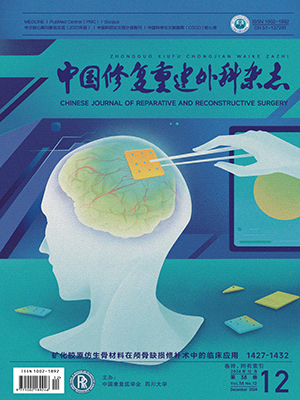Objective To study degradation of the antigen-extracted meniscus in PBS solution with no enzyme or with different enzymes. Methods Four types of enzymes (collagenase, hyaluronidase, trypsin, papain) were used to enzymolyze the antigen-extracted meniscus and the fresh meniscus for 3, 7, 15 and 30 days (37℃). The antigenextracted meniscus and the fresh meniscus were immersed in PBS solution (37℃) for 30 days. Weight loss measurement, UV spectrophotometry, and scanning electron microscopy (SEM) were used to characterize the degraded materials. Results The two types of the materials were remarkably digested under the enzymes, especially under trypsin. The degradation curves showed that the antigen-extracted meniscus was enzymolyzed less than the fresh meniscus. The degradation products were grouped as amino, peptide, and polyose by the analysis. Both of the materials could hardly behydrolyzed in PBS solution without the enzymes. The four different enzymes had different surface morphologies under the examination of SEM. Conclusion The antigen-extracted meniscus is enzymolyzed more slowly than the fresh meniscus in vitro, and the result can be used as a guideline to the further research.
Citation: LI Xiaofeng,CAI Daozhang,WANG Kun,et al.. DEGRADATION OF ANTIGENEXTRACTED MENISCUS IN VITRO. Chinese Journal of Reparative and Reconstructive Surgery, 2006, 20(4): 444-447. doi: Copy
Copyright © the editorial department of Chinese Journal of Reparative and Reconstructive Surgery of West China Medical Publisher. All rights reserved




